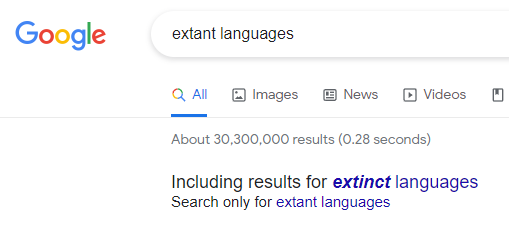154
you are viewing a single comment's thread
view the rest of the comments
view the rest of the comments
this post was submitted on 20 Feb 2024
154 points (100.0% liked)
tails: A Place for Mastodon Posts
344 readers
1 users here now
A virtual community
Posts from Mastodon users, featured natively in a community, so you can view them without the need for them to be re-hosted or screenshoted, and reply to the original author and Mastodon respondents if you wish.
Has so far included content from Warsandpeas, Mr. Lovenstein, SMBC, Loading Artist, Low Quality Facts, nixCraft, ElleGray, and other interesting or provocative stuff I've random'd across on Mastodon.
Supported:
Comments & Upvotes
Unsupported:
Posts, Downvotes, & PD's Automod
founded 10 months ago
MODERATORS

I get that, I don't think that's related to some failure of Google though. The problem originates with the different meaning of "extinct" in relation to language, and consequently the meaning of its opposite. I think what you're looking for is "living languages", and you'd need a full-on LLM search assistant to be able to make a connection between "extant" and "living" languages because generally those aren't synonyms.
@gila or they could have searched for "extant languages" when I searched for extant languages and searched for "live languages" when I searched for live languages
If it did, then you’d still not get any relevant results, because again, those aren’t things. A list of extant languages would simply be a list of all languages throughout history that aren’t delineated as some kind of proto-language developed by early humans. Such specificity is not at all conveyed by the term “extant languages”. The search engine can’t reply, “under what circumstances are they extant? Are Klingon, C++, Heiroglyphs desired results? They’re extant!”
I would agree insofar as “live languages” should autocorrect to “living languages”, but it is getting pretty into the weeds linguistically